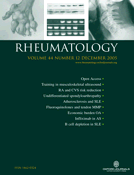-
PDF
- Split View
-
Views
-
Cite
Cite
A W Evers, E Taal, F W Kraaimaat, J W Jacobs, A Abdel-Nasser, J J Rasker, J W Bijlsma, A comparison of two recently developed health status instruments for patients with arthritis: Dutch-AIMS2 and IRGL. Arthritis Impact Measurement Scales. Impact of Rheumatic diseases on General health and Lifestyle., Rheumatology, Volume 37, Issue 2, 1998, Pages 157–164, https://doi.org/10.1093/rheumatology/37.2.157
Close - Share Icon Share
Abstract
Two multidimensional health status instruments of rheumatic diseases, the Dutch-AIMS2 and the IRGL (Impact of Rheumatic diseases on General health and Lifestyle), were compared in a sample of 284 rheumatoid arthritis patients with regard to their measurement properties and usefulness for research purposes. Both questionnaires showed an excellent reliability (Cronbach's alpha), and were highly comparable with regard to their construct and convergent validity. Second-order factor analysis confirmed the physical, psychological and social health dimensions for both questionnaires. The comparability between the instruments was established by high intercorrelations between the physical and psychological health dimensions. Sufficient convergent validity was indicated by the strong correlations between the physical functioning scales and clinical and laboratory measures. The main differences between both questionnaires relate to their length and emphasis on health aspects. The Dutch-AIMS2 is characterized by a more extensive assessment of the physical dimension and the additional measurement of general health aspects. The shorter IRGL exclusively assesses the main health dimensions with a more comprehensive measurement of the psychological and social dimensions. The instrument that reflects the subject in question most adequately should be chosen.




Comments